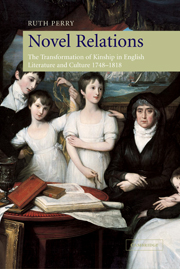Book contents
- Frontmatter
- Contents
- Acknowledgments
- Introduction
- 1 The great disinheritance
- 2 Fathers and daughters
- 3 Sister-right and the bonds of consanguinity
- 4 Brotherly love in life and literature
- 5 Privatized marriage and property relations
- 6 Sexualized marriage and property in the person
- 7 Farming fiction: Arthur Young and the problem of representation
- 8 The importance of aunts
- 9 Family feeling
- Bibliography
- Index
7 - Farming fiction: Arthur Young and the problem of representation
Published online by Cambridge University Press: 22 September 2009
- Frontmatter
- Contents
- Acknowledgments
- Introduction
- 1 The great disinheritance
- 2 Fathers and daughters
- 3 Sister-right and the bonds of consanguinity
- 4 Brotherly love in life and literature
- 5 Privatized marriage and property relations
- 6 Sexualized marriage and property in the person
- 7 Farming fiction: Arthur Young and the problem of representation
- 8 The importance of aunts
- 9 Family feeling
- Bibliography
- Index
Summary
It has been very justly said that I first excited the agricultural spirit which has since rendered Britain so famous; and I should observe that this is not so great a compliment as at first sight it may seem, since it was nothing more than publishing to the world the exertions of many capital cultivators and … common farmers who, with all their merit, were unknown beyond the limits of their immediate district.
Arthur Young, The Autobiography of Arthur Young, p. 30.When a nation abounds in manufactures and mechanic arts, the proprietors of land, as well as the farmers, study agriculture as a science, and redouble their industry and attention. The superfluity, which arises from their labor is not lost … In times of peace and tranquillity, this superfluity goes to the maintenance of manufacturers, and the improvers of liberal arts. But it is easy for the public to convert many of these manufacturers into soldiers, and maintain them by that superfluity, which arises from the labour of farmers.
David Hume, “Of Commerce,” Essays (ed. Eugene Miller), p. 261.Should a poor man take one of Your sheep from the common, his life would be forfeited by law. But should You take the common from a hundred poor mens sheep, the law gives no redress. The poor man is liable to be hung for taking from You what would not supply You with a meal & You would do nothing illegal by depriving him of his subsistence.
C. Landor to the Marquis of Anglesey, April 26, 1824- Type
- Chapter
- Information
- Novel RelationsThe Transformation of Kinship in English Literature and Culture, 1748–1818, pp. 288 - 335Publisher: Cambridge University PressPrint publication year: 2004



